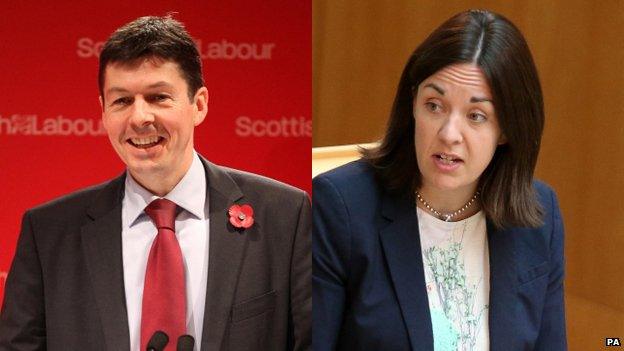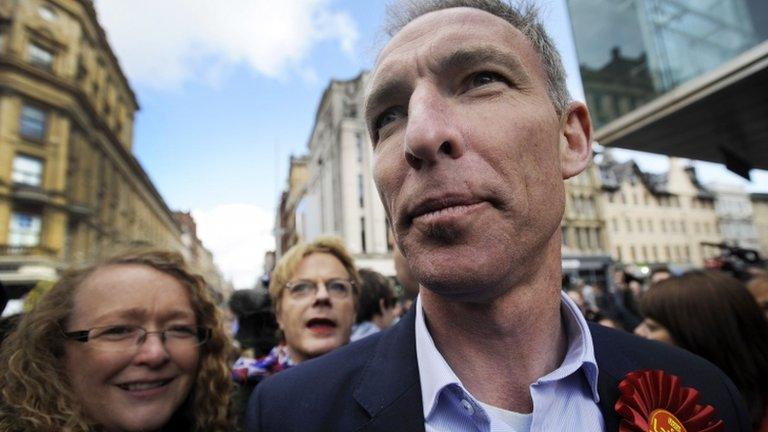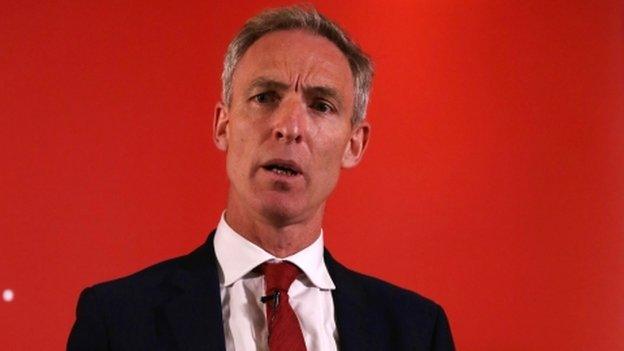Scottish Labour agrees reform plan
- Published
Jim Murphy: "After I have made a speech on Monday... I will leave the stage"
Jim Murphy has stood down as Scottish Labour leader as the party agreed to his plan for "dramatic" change.
Mr Murphy announced his intention to resign last month despite narrowly winning a confidence vote in the wake of Labour's general election defeat.
He had since been drawing up plans for reforms which he hopes will lead to the party's recovery in Scotland.
Labour lost 40 of its 41 Scottish constituencies to the SNP, including Mr Murphy's East Renfrewshire seat.
The party has also announced a timetable for the election of a new leader and deputy leader, with the result of the contests to announced on 15 August.
Modern Scotland
The leadership contest is expected to be between current deputy leader Kezia Dugdale and the party's social justice spokesman, Ken MacIntosh.
Speaking at a media conference in Glasgow on Saturday afternoon, Mr Murphy said Scottish Labour should better reflect modern Scotland.
He unveiled five proposals which he said had been agreed in principle by party's executive council.
These included electing a new leader through a one member one vote system rather than the electoral college system which requires a majority vote in at least two out of three blocks, comprising elected members, ordinary members and unions.
Mr Murphy was elected as leader despite opposition from the union college, which backed his opponent Neil Findlay last year.
The party will also reopen its selection process for the Regional Lists to attract the widest possible range of candidates for the 2016 Scottish Parliament elections.

Ken MacIntosh and Kezia Dugdale both want to succeed Mr Murphy as Scottish Labour leader
This would "abolish the closed shop arrangements for list MSPs so that every Labour Party member has a fair chance of standing for the list, and so that incumbency isn't a guarantee of re-selection", Mr Murphy said.
Mr Murphy also said the party would consider establishing a national selection panel for local councillors, and consider the use of primaries in the selection of MP candidates in future elections.
And he said the party would do more to publicise a "little-known rule" which would allow it to waive the qualifying period before members can become candidates.
Mr Murphy added: "While commitment to the party will always be crucial, strong candidates can have other attributes other than time served.
"We want business people, charity workers, NHS staff and many others who support Labour to stand for Labour - even if up until now they never felt able to join Labour."

Analysis by Laura Bicker, BBC news correspondent
The reforms were billed as dramatic, but for some members they will not go far enough.
Some had suggested that Scottish Labour should break away from the main UK party to make the message to voters more distinct. But Jim Murphy says this would be a mistake.
Instead, he says the party should change the way leaders are elected and candidates are selected. He also wants to ensure more members, even those who have been in the party for only a few months, can be selected as parliamentary candidates.
The aim is to make the party feel more open. The message is come and join us. But will voters listen?
Polls suggest SNP support is continuing to rise and the party could be on course to win more seats in the Scottish Parliament elections next May.
Voters in Labour heartlands did not abandon the party and vote SNP because the leader was appointed by an electoral college. But the reforms could make the party feel more approachable and it could turn up a few interesting new faces as candidates.
It has certainly worked for the SNP. Many of their parliamentary candidates were untried, untested politicians. In fact, some had only been in the party a few months, but they were well-known, popular local figures during the independence referendum campaign.

Former leader Iain Gray, who is currently the party's education spokesman in the Scottish Parliament, has been appointed acting leader until a new leader is elected.
Mr Gray will represent Scottish Labour at First Minister's Questions for the next two weeks until the summer recess.
He said: "We are grateful to Jim for his service to our party and our movement. At a time when it would have been easier to walk away, he stepped up and led with great energy and passion.
"The Scottish Executive Committee has passed a substantial package of reforms today that will be vital to the rebuilding of the Labour Party.
"Make no mistake - the road back for Scottish Labour will be long and difficult. It won't happen overnight and we can't expect it to. After today, though, I am confident about the long-term future of Scottish Labour."
Mr Murphy, who took over the leadership from Johann Lamont last December, had faced calls to resign from several MSPs, trade unions and former MPs after his party was almost wiped out in Scotland at the election.
In his resignation speech, he acknowledged the election defeat had been "terrible" for Scottish Labour.
'Traumatic defeat'
He added: "If anything good can come from such a painful defeat, it is that we are free to be bolder in our message, to reach further into the population for talent, and to renew our organisation to better reflect modern Scotland.
"The defeat was traumatic and so it is right that, today, we announce a set of changes that are dramatic."
Mr Murphy said that he does not have a new job yet but said he would be a source of "discreet advice" if asked for it by his successor, and will always be an "active and faithful servant" of the party.
Asked whether he felt the Scottish Labour Party should break away from the UK Labour Party, he said: "Having campaigned to stay within the United Kingdom, I'm thinking it makes sense just a few short months later to retain those links with the United Kingdom Labour Party.
"So, of course, the Scottish Labour Party has to make its own decisions about issues that are devolved to the Scottish Parliament.
"But breaking away from the rest of the United Kingdom Labour Party, that loses us one of our key strengths, that old-fashioned idea of unity and strength, and we achieve much more together than we do apart."
- Published16 May 2015

- Published16 May 2015
